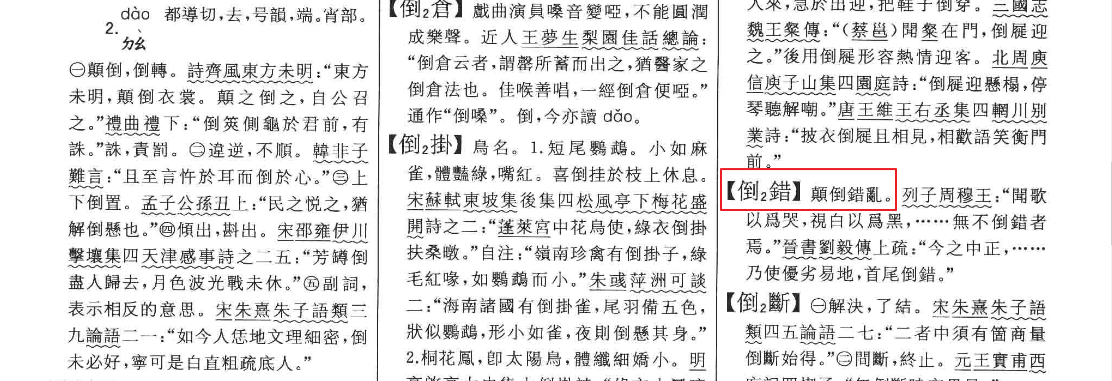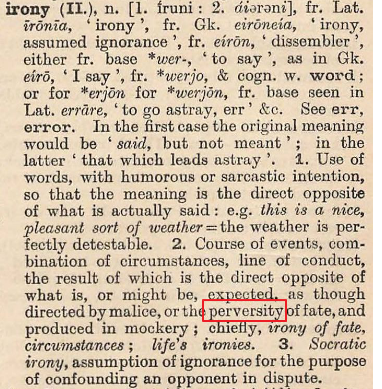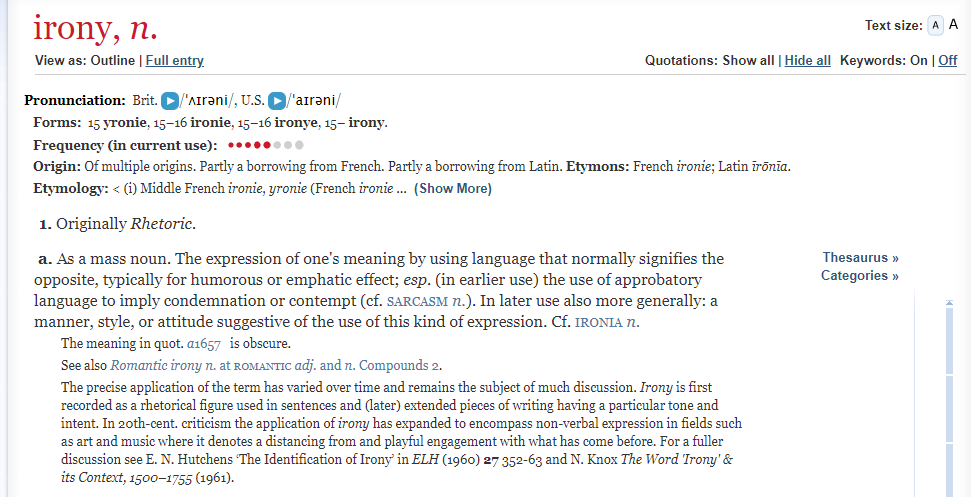|
|
本帖最后由 klwo2 于 2020-11-22 14:26 编辑
irony的意思是反话,把话反着说,正的说成反的,好的说成坏的,不是为了骗人,而是为了修辞。
说反话,跟「讽刺别人」,不是一回事。讽刺别人的时候,可以通过说反话的手段来实现,也可以不用。
汉语大词典「讽刺」:「以婉言隐语相讥刺」。通过其他委婉的手段批评人,也叫讽刺,不是非要说反话不可。
英语里面,satire 才是「讽刺」,irony不是「讽刺」,irony只是「说反话」而已。这个问题,英英词典都说得很清楚:
World Book Dictionary
Irony, sarcasm, satire are humorous forms of expression. Irony consists in deliberately saying the opposite of what one means, relying on tone of voice or on context to indicate one’s real intent:
that noble and loyal patriot, Benedict Arnold.
In sarcasm the aim is to hurt someone’s feelings and so, whether stated ironically or not, it is always cruel and biting:
When a boy refers to another boy as “mamma’s little darling,” he is using sarcasm.
In satire the aim is to expose and attack vice or folly, using irony, sarcasm, or other forms of humor to do so:
In “Gulliver’s Travels” Jonathan Swift makes notable use of satire.
可惜英汉词典依然执迷不悟,天天给莘莘学子灌输irony=「讽刺」,灌输完了还打广告说自己「特别能解决中国学生的困惑」!!!!
建宏e世代
![]()
释义里说是「讽刺」。跑到字辨里却变成了「反语」,莘莘学子看了怎能不崩溃跳楼?
受此影响,苏格拉底的irony也有一堆英汉词典解释不清楚。
——————————————————————————————————————————————————
其实irony 完全可以换用其他汉语词语来解释嘛!个个都说汉语博大精深,翻译英文的时候,「博大精深」四个字到哪里去了?
我主张,irony 在有的时候可以翻成「倒错」「颠倒错乱」,因为:
1. 英英词典解释「irony」,常常用opposite、contrary、reverse来解释,就是反了,倒了,和「倒错」意思一致。
新牛津:
a state of affairs or an event that seems deliberately contrary to what one expects and is often amusing as a result
韦氏高阶:
a situation that is strange or funny because things happen in a way that seems to be the opposite of what you expected
Random House Webster's Unabridged:
an outcome of events contrary to what was, or might have been, expected.
W3:
a state of affairs or events that is the reverse of what was or was to be expected : a result opposite to and as if in mockery of the appropriate result <the ~ of fate>
辞源3「倒错」:

2. 英英词典几乎从来不用satire 来解释irony,但有辞书用perverse来解释irony。perverse/perversion/perversity有对译词「倒错」
牛津高阶双解(第四版)
situation, event, etc that is desirable in itself but so unexpected or ill-timed that it appears to be deliberately perverse ……(其本身未始不可取,但因出人意料或来非其时而似故意乖违):
He inherited a fortune but died a month later; one of life's little ironies.他继承一笔遗产后一个月就死了,有点时乖命蹇吧。
牛津高阶4双解并没有彻底戒掉「讽刺」,但是译者显然注意到这个词的麻烦之处了,所以引入「乖违」「时乖命蹇」来调和。比张口闭口只会说「讽刺」俩字的译者强。
Concise Oxford Dictionary 9th
an ill-timed or perverse arrival of an event or circumstance that is in itself desirable.
牛津高阶4用perverse,是继承的COD。我说过了,早期的牛津高阶,跟COD很亲。
Universal Dictionary of the English Language [Henry Cecil Wyld],说perversity:

还有辞书用incongruity来解释irony。incongruity是「不一致」「不协调」,跟「错位」接近。
American Heritage Dictionary:
Incongruity between what might be expected and what actually occurs
Merriam-Webster:
incongruity between the actual result of a sequence of events and the normal or expected result
3. 从英英词典的解释可以看出:irony的本质是「反着来」「倒着来」「说反话」,可是附加的意思可以很多,「strange/funny/amusing/sad」这些层面都可以随着上下文出现。

2013年OED修订这个词的时候,说这词的内涵丰富着哪,干脆指示读者去翻阅书籍、论文!
For a fuller discussion see E. N. Hutchens ‘The Identification of Irony’ in ELH (1960) 27 352-63 and N. Knox The Word 'Irony' & its Context, 1500–1755 (1961).
与此相比,英汉词典的译者呆若木鸡,不知变通,看见irony只会说「讽刺」,不是很荒唐吗?!更不要说satire 才是「讽刺」,irony根本不是。
irony 表达「opposite、contrary」的层面,内涵简单,「倒错」有,「讽刺」没有
表达「strange/funny/amusing/sad」的层面,内涵复杂,「倒错」「讽刺」都没有
所以在翻译的时候,要想把两面都照顾到,需要看准语境,适当加一些词,比如「啼笑皆非」「又好笑又可悲又好气」
「命运的讽刺」,可以改说「像是命运偏跟人作对,偏跟人反着来」。也可以说「命运的嘲弄」,「嘲弄」对应英英词典释义说的mockery(as if in mockery of the appropriate result)。
下面改译一些句子:
The tragic irony is that the drug was supposed to save lives.
可悲的讽刺在于,这药本来是用来挽救生命的。
怎奈造化弄人,这药原本是救命用的。(「造化弄人」「命运的嘲弄」=mockery(as if in mockery of the appropriate result))
The ultimate irony is that the revolution, rather than bringing freedom, actually ended it completely.
革命非但没有带来自由,反而是完全结束了自由,这真是莫大的讽刺。
革命非但没有带来自由,反倒是彻底结束了自由,这着实荒唐透顶。(「反倒」表达「opposite、contrary」,「荒唐」表达「strange/funny/amusing/sad」)
It is a nice irony that the rivalry among popes was solved by their ancient rival, the Holy Roman Emperor.
教皇之间的争斗竟然由他们的老对手神圣罗马帝国皇帝解决了,这简直是绝妙的讽刺。
几个教皇你争我斗,最后竟然由他们的宿敌,也就是神圣罗马皇帝摆平了,这么颠倒错乱的事情,实在是绝了。(「颠倒错乱」表达两个层面)
It was an irony that the firehouse burned.
消防站被火烧了,这可是个讽刺。
消防站被火烧了,真叫人笑也不是,哭也不是。(表达「strange/funny/amusing/sad」,笑、哭本来就是反义词,隐含「opposite、contrary」)
Opposition parties lost no time in stressing the irony of his return to power after being rejected by voters in November.
他11月份被选民否决后再次上台, 反对党立刻对这件事的讽刺性大做文章。
他11月份被选民整下来以后,再次上台执政,反对党立刻大做文章,使劲宣扬此事有多么荒诞、多么颠倒错乱。(怎么听着像是韩国瑜?)
还有一些很简单的句子,应该是「说反话」,无奈某些英汉译者脑子里缺根弦,只知道「讽刺」:
Wagner calls his program ‘the worst talk show in America,’ without a hint of irony.
瓦格纳不带一丝讽刺,称他的节目是“美国最糟糕的访谈节目”。
瓦格纳说他的节目是“全美国最烂的访谈节目”,这不是说反话。
'England is famous for its food,' she said with heavy irony.
“英格兰的食物很有名哪。” 她极其讽刺地说道。
“英格兰是出了名的美食多啊/英格兰菜是出了名的好吃啊。” 她故意说反话。(牛津高阶4还是「说反话」,牛津高阶8就变成了「讽刺」,可谓每下愈况……)
|
评分
-
2
查看全部评分
-
|